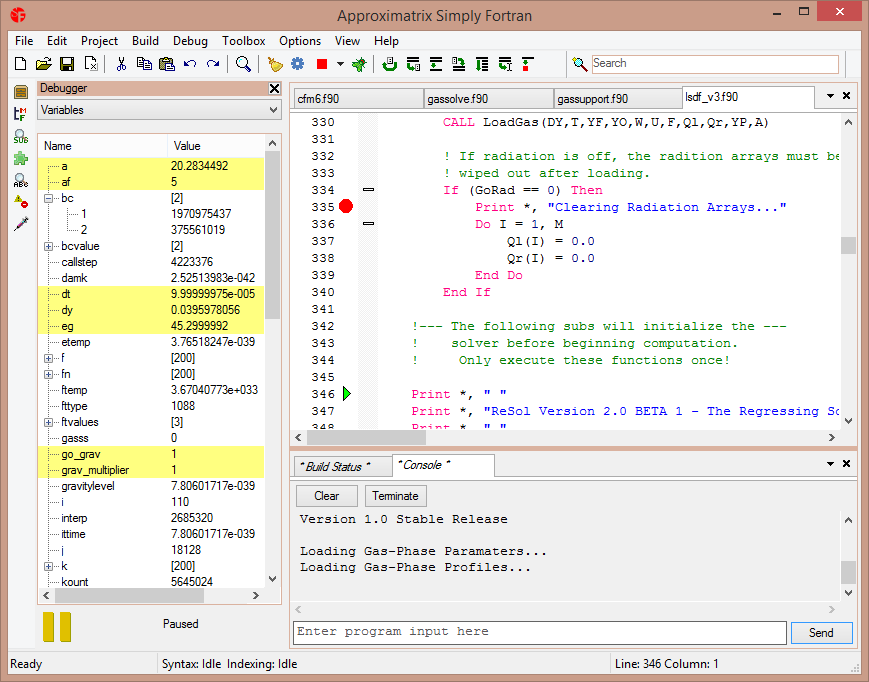
- Simply fortran vs visual studio how to#
- Simply fortran vs visual studio code#
- Simply fortran vs visual studio zip#
- Simply fortran vs visual studio free#
- Simply fortran vs visual studio windows#
I'm trying to link gidpost.lib in Intel Visual Fortran Compiler but Subject: gidpost.lib for Intel Visual Fortran Compiler
Simply fortran vs visual studio code#
The library again from the source code with the appropiated settings to beįortran-External procedures -calling convention to 'default' or maybe to I attach the gidpost.lib library (win x32) that a I am using (I recompiled Least I tested it with Intel Visual Fortran 10.1.25 on Microsoft Visual Yee, It is possible to use gidpost also with Intel Visual Fortran (at Then it should work with no problem on any Subroutines? It works better for me since I can compile them along with my Is it possible for me to get the source code of gidpost.lib in the form of The revised lib file doesn't work on my machine (Intel Visual Fortran 11.1 GiD postprocess file must be createdįrom: "Furui, Kenji" Kenji.Furui at Visual Fortran 10.1.25 on Microsoft Visual Studio 2005 (the project isĪ testpostfor.exe program must be created, and running it a I attach you a simple Fortran example (testpostfor.f) compiled with Intel What is happening with our compiled library? It is not possible to link it
Simply fortran vs visual studio windows#
Using on Windows MS Visual C++ 2005 or 2008) To compile it is necessary off course this kind of language compiler (we are
Simply fortran vs visual studio zip#
The source code C/C++ is of the GiD post is included in the downloaded zip

I'm using Intel Visual Fortran 11.1 on Microsoft Visual Studio 2008. Could you please tell me if it's compatible? - It seems gidpost.lib works in Compaq Visual Fortran though. I'm trying to link gidpost.lib in Intel Visual Fortran Compiler but getting error messages. I think that to link you must set the propertyįortran-External procedures -calling convention to 'default' or maybe to CVF (/iface:cvf) I attach the gidpost.lib library (win x32) that a I am using (I recompiled the library again from the source code with the appropiated settings to be linked with this FORTRAN version) Yee, It is possible to use gidpost also with Intel Visual Fortran (at least I tested it with Intel Visual Fortran 10.1.25 on Microsoft Visual Studio 2005) Subject: Re: gidpost.lib for Intel Visual Fortran Compiler Then it should work with no problem on any Fortran compiler.įrom: Adria Melendo Is it possible for me to get the source code of gidpost.lib in the form of subroutines? It works better for me since I can compile them along with my source code for our program. The last step can be done by adding “testfor.lib” into Project-> Properties-> Configuration Properties-> Linker-> Input-> Additional Dependencies. Remember the resultant exe file do require the testfor.dll in the path in order to run.The revised lib file doesn't work on my machine (Intel Visual Fortran 11.1 / Visual Studio 2008) neither. What we need to do is simply add the testfor.lib in the resource folder and let VS know you need it to compile. Now we need to go into Visual Studio to set up. Now we have what we need, the testfor.lib and testfor.dll. The last line with lib.exe earlier is to create the import lib with the def file. It may complain with the following error:ĭllwrap.exe: no export definition file provided.Ĭreating one, but that may not be what you wantīut I think we can ignore it. The dllwrap.exe comes with MinGW as for as I know. Second command creates the definition file (.def) and the dll file (.dll).

To get these files, we need to the following steps:ĭllwrap.exe -export-all-symbols testfor.o -lgfortran -output-def f -o testfor.dllįirst command is simply compiling our Fortran module into an object file. Here is the main dish! In Windows, we need the “import” library (.lib) and dynamic library (.dll). Note that the input argument for the Fortran function must be a pointer as Fortran is pass-by-reference only. The “extern C” syntax acts as an interface. Next, my C++ main function is very simple as well: Anyway, that helps us clean up the code a little. If you are using the old (pre-2003) style, the naming convention for a function in a module may be a little complicated. The “bind” syntax allow you to customize the function name to be called in C++. Note that I am using Fortran 2003 standard “iso_c_binding”. Print *, "# calling testfor in Fortran!!" Subroutine testingfor(x) bind(c, name="testingfor")

My Fortran code is just a simple function in a module:
Simply fortran vs visual studio free#
Simply fortran vs visual studio how to#
Here I describe a little on how to call Fortran code from C++ using Visual Studio.


 0 kommentar(er)
0 kommentar(er)
